THE BICAMERAL MIND - From the Iliad to Westworld
What do have Westworld, schizophrenics and the Mycenaeans in common? Well, they all have in common a fantastic theory developed by Julian Jaynes in his series of books about the advent of a conscious mind in human beings.
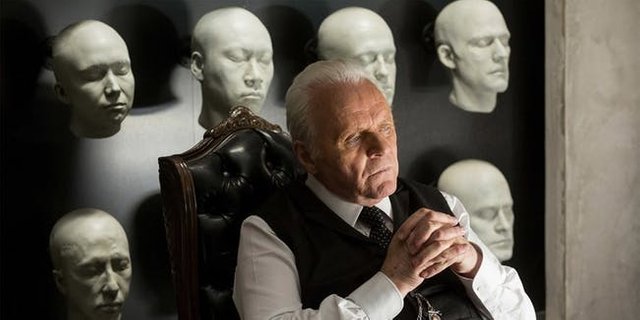
[Source]
The Bicameral Mind
Like many of you (probably), I learned about the terms “bicameral mind” thanks to the recent series Westworld developed by Jonathan Nolan from the book (and movie) by Michael Crichton. In the series, the bicameral mind was a kind of safety system, the Operating System of the androids built by a powerful leisure corporation to serve the fantasies of rich human beings in a huge resort park cut off from the rest of the world.
So far so good, but the true origin about the Bicameral Mind is even more interesting and grandiose.
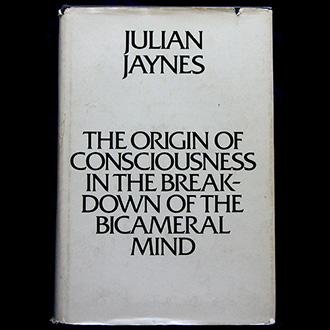
[Source]
Julian Jaynes first exposed his ideas in 1969 and fleshed them out in a book published later on in 1976, called The Origin of Consciousness in the Breakdown of the Bicameral Mind. So, to be fair to his work,I must follow the flow of his book to be able to convey exactly how much it is groundbreaking and fascinating.

It all comes from the most exciting and the most boring question there is: what is consciousness?
What is NOT consciousness?
Hey! Come back! I’ll cut it short by giving you the exact conclusions reached by Jaynes, which are not even his, and which can be seen as the pedestal upon which he built the fantastic statue that is his theory. And to compare his theory to the act of sculpture is not innocent but what does a sculptor do except size down a block of material in order to reach the desired and imagined core of his imagination?
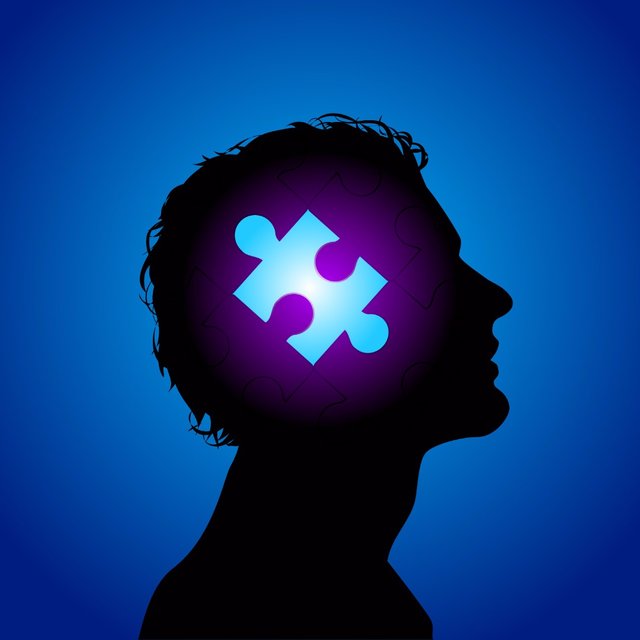
[Source]
So, Jaynes finds out that consciousness is NOT:
It is NOT to be confused with reactivity.
We usually associate conscious with being conscious. It implies for example that any organism which moves and reacts to stimulii must be conscious. There is a slippery slope there:
And anyone who observes amoebas hunting food or responding to various stimuli, or paramecia avoiding obstacles or conjugating, will know the almost passionate temptation to apply human categories to such behavior.
But even at a human level, there is a problem, because who can says he is fully conscious all day? We can even do technical stuff without paying attention (driving a car, writing…). Consciousness seems like a small part of our mentality therefore. We can hear, see, touch, feel without ever being conscious. The stimulus reach our brains and senses but our conscious can just skip it.
It is NOT a metaphysical imposition.
It is easy to think of consciousness as a gift (or a curse) from higher powers, after all:
The intellectual life of man, his culture and his history and religion and science, is different from anything else we know in the universe.That is a fact. It is as if all life evolved to a certain point, and then in ourselves turned at a right angle and simply exploded in a different direction. [...] There has to be more to human evolution than mere matter, chance, and survival. Something must be added from outside of this closed system to account for something so different as consciousness.
But this theory fell upon deaf ear among most of the scientific community, for obvious reasons: it could never be proven right, or wrong. Such was the trickiness of consciousness.
It is NOT involved in the performance of skills and often hinders their execution.
Imagine you want to learn tennis or piano. Your consciousness is useful to put your mind to it. But it will be useless to learn. Even worse: if you are conscious of everything, you’ll be irremediably bad and won’t be able to focus and hit the ball or the key. Learning has nothing to do with consciousnes:
Consciousness is often not only unnecessary; it can be quite undesirable. [...] Try speaking with a full consciousness of your articulation as you do it. You will simply stop speaking.
It does not copy down experience, as most people think.
Most people would protest emphatically that the chief function of consciousness is to store up experience, to copy it as a camera does, so that it can be reflected upon at some future time.
That’s supposed to be why you can remember which way a door opens, where is your favourite armchair, or which key goes where… But you don’t actually make any effort to recall all those things, and you don’t even remember learning them at any point.
What you can consciously recall is a thimbleful to the huge oceans of your actual knowledge. And sometimes, you have to invent yourself your own memories to justify your day to day place on the face of the earth.
Consciousness is not at all involved in signal learning, and need not be involved in the learning of skills or solutions, which can go on without any consciousness whatever.
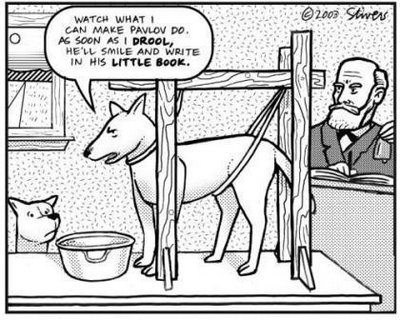
If a distinct kind of music is played while you are eating a particularly delicious lunch, the next time you hear the music you will like its sounds slightly more and even have a little saliva in your mouth. The music has become a signal for pleasure which mixes with your judgment.
However, in similar experiences, it has been proven that if the subject is told about the point the experience is trying to prove, the learning does not work. Consciousness, in other words, impairs learning.
It is not necessary for making judgments or in simple thinking.
Another way of saying it is that one does one’s thinking before one knows what one is to think about. The important part of the matter is the instruction, which allows the whole business to go off automatically. It is not the seat of Reason.

The picture of a scientist sitting down with his problems and using conscious induction and deduction is as mythical as a unicorn. The greatest insights of manking have come more mysteriously. [...] And a well known physicist in Britain once told Wolfgang Kohler, “We often talk about the three B’s, the Bus, the Bath and the Bed. That is where the great discoveries are made in our science.”
Once he has defined all of this, Jaynes is able to define the core of consciousness:
The Features of Consciousness
- The ability of spatialization.
When we introspect (a metaphor of seeing into something), it is upon this metaphorical mind-space which we are constantly renewing and 'enlarging' with each new thing or relation consciousized.
In our mind-space, we can separate, classify, turn and analyze things which are not even physical:
If I ask you to think of the last hundred years, you may have a tendency to excerpt the matter in such a way that the succession of years is spread out, probably from left to right. But of course there is no left or right in time.
- The excerption feature.
An excerpt of a thing is in consciousness the representative of the thing or event to which memories adhere, and by which we can retrieve memories.
Since we are not able to take anything complicated as a whole, we tend to “excerpt”: think about New York and the statue of liberty and a few streets will popup. Think of a circus, and you’ll see a few animals, jugglers, and a tent. And this is it, and usually enough to make you grasp the general context.
- The Analog I.
When we think about ourselves, we are thinking about the Analog I, We imagine 'ourselves' 'doing' this or that, and thus 'make' decisions on the basis of imagined 'outcomes' that would be impossible if we did not have an imagined 'self' behaving in an imagined 'world'.
If we are out walking and two roads diverge in a wood, and we know that one of them comes back to our destination after a much more circuitous route, we can “traverse” that longer route with our analog I to see if its vistas and ponds are worth the longer time it will take. Without consciousness with its vicarial analog I, we could not do this.
- the Metaphor Me
the difference with Analog I is that we step back from ourselves and can consider ourselves from outside, contrary to the Analog I which is simply our inner view of the world.
- the Narratization feature
being conscious means we are constantly threading a story to justify our behaviours - The assigning of causes to our behavior or saying why we did a particular thing is all a part of narratization. Such causes as reasons may be true or false, neutral or ideal. Consciousness is ever ready to explain anything we happen to find ourselves doing.
A child cries in the street and we narratize the event into a mental picture of a lost child and a parent searching for it.
- the Conciliation feature
this is our ability to internalize and assimilation stimulus in a coherent way with our common experience - We are putting things together into recognizable objects on the basis of the previously learned schemes we have of them. - If the conciliation is impossible, this is where narratization intervenes to fill in the gaps!.
Conclusion
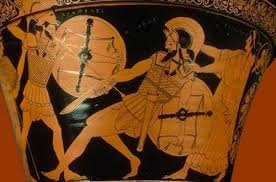
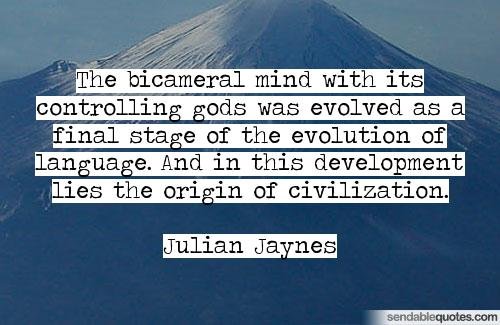
TO BE CONTINUED...
While I had heard of the "bicameral mind" before, your article has brought it to my "conscious attention" for the first time. ;)
I was recently discussing with @tarazkp the ability of the human mind to simulate things, which sounds like a significant component of this theory.
You have done a nice job of laying it out and improving my understanding, Thank you.
This is a topic of considerable interest to me. I often wonder whether, if we were to create a hardware simulation with a similar scope and architecture as the human brain, and then expose it to stimuli approximating the development of a human child, Would it develop "consciousness?"
I know this idea has been treated fictionally any number of times in the genre of Science Fiction. However, I think that we are rapidly approaching the point at which we will be able to actually construct such an entity with physical hardware. What happens when we turn it on? What are the moral implications?
Thank you, friend @herverisson, for a fascinating study! :D

😄😇😄
Glad that you enjoyed it! This is just the beginning of course, the next article will cover the Bicameral mind proper :) Even more fascinating. And yes, we are fast approaching the point where there will be artificial consciousness and then... we will have a big debate on our hands...
I think that working through such deep issues before we are faced with them would be of considerable value!
I look forward to your upcoming article. ;)
Unfortunately it's impossible to cover all aspects and cases! Imagine if in the 60s we would have said: let's cover all the legal and moral issues of this new thing called... Internet! impossible... Law and moral is always one step behind of science and nature.
Understood! However, the better use we make of our bicameral minds to simulate the possibilities, the better prepared we may become. ;)
As an amateur theologian, I have some great curiosities about how this might all play out. I believe we are made "in God's image," i.e. granted a substantial portion of his qualities and abilities. The prospect of actually creating a conscious entity is simultaneously fascinating and terrifying to me. :O
great share
Hi I really loved your post, thanks for posting
Nice post. Thank you!
Thanks! Follow for more about the Bicameral Mind, this is just the groundwork of Julian Jaynes' breakthrough!
Are there touch points between the work of Jaynes and Jung? Jung focussed a lot on the unconsciousness (what is not consciousness).